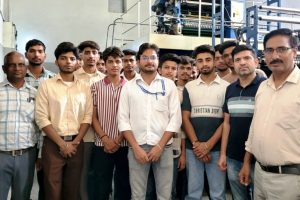
The Importance of Faculty Development Program
SHAH SATNAM JI BOYS COLLEGE POST ON-
The Importance of Faculty Development Programs for Our College Staff:
Faculty Development Programs (FDPs) are vital initiatives within educational institutions, particularly in colleges where the quality of education heavily depends on the competence and effectiveness of the teaching staff. At Shah Satnam Ji Boys College, the importance of FDPs cannot be overstated, as they serve as a cornerstone for continuous improvement and professional growth among faculty members. Here are several key reasons why these programs are essential for our college staff:
1. Enhancing Teaching Quality
FDPs provide faculty members with the latest teaching methodologies, pedagogical theories, and educational technologies. By participating in these programs, educators can refine their teaching skills, adopt innovative instructional strategies, and create more engaging learning experiences for students. This enhancement in teaching quality ultimately leads to better academic outcomes and student satisfaction.
2. Staying Updated with Industry Trends
The education sector is constantly evolving, with new developments in curriculum design, assessment methods, and educational technology. FDPs ensure that faculty members stay current with these changes, equipping them with the knowledge needed to adapt their teaching practices accordingly. Staying updated helps educators remain relevant and effective in their roles.
3. Promoting Lifelong Learning
Participating in Faculty Development Programs fosters a culture of lifelong learning among educators. By encouraging staff to engage in continuous professional development, our college promotes the idea that education does not end with initial qualifications. This commitment to ongoing learning not only enhances individual growth but also serves as a positive example for students.
4. Building a Collaborative Environment
FDPs often facilitate collaboration among faculty members, allowing them to share best practices, teaching experiences, and resources. This collaborative approach fosters a supportive academic community where educators can learn from one another, thereby enhancing the overall teaching and learning environment.
5. Increasing Job Satisfaction and Retention
Investing in faculty development shows a commitment to the professional growth of staff members. When educators feel valued and supported through training opportunities, their job satisfaction increases. Higher job satisfaction contributes to staff retention, reducing turnover rates and the associated costs of recruiting and training new faculty.
6. Developing Leadership Skills
FDPs often include components that focus on developing leadership qualities among faculty members. By participating in these programs, educators can cultivate essential leadership skills that not only enhance their teaching but also prepare them for potential administrative roles within the college. Developing leadership capacity strengthens the institution and contributes to its overall effectiveness.
7. Encouraging Innovation and Creativity
Through FDPs, faculty members are encouraged to think creatively and experiment with new teaching strategies and technologies. This focus on innovation leads to more dynamic and effective teaching practices, allowing educators to better meet the diverse needs of their students and adapt to changing educational landscapes.
8. Enhancing Student Engagement and Learning Outcomes
Ultimately, the primary goal of Faculty Development Programs is to improve student engagement and learning outcomes. Well-trained and confident educators can create more interactive and meaningful learning experiences, leading to better academic performance and student success. When faculty are empowered, students thrive.
Conclusion
The importance of Faculty Development Programs at Shah Satnam Ji Boys College lies in their ability to enhance teaching quality, promote lifelong learning, and foster a collaborative and innovative environment. By investing in the professional development of our college staff, we not only improve the educational experience for our students but also create a culture of excellence within the institution. As we continue to prioritize faculty development, we set the stage for a brighter future for both our educators and the students they inspire.



